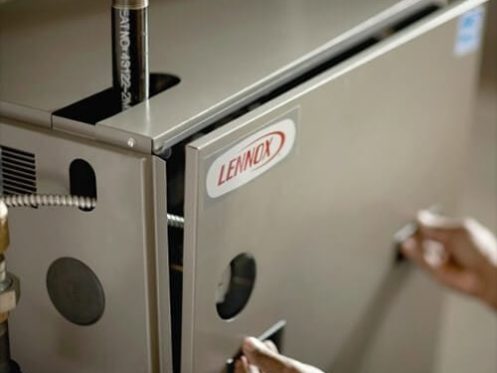Whether your furnace is up to code is not something that you think about often, at least not as long as it’s working. When you need a major repair or you’re thinking of selling or refinancing your home, this is something you might want to explore. How do you know if your furnace is up to code?
Why Building Codes Matter for Your Furnace
Unless you installed or repaired your furnace yourself, you might think that you can be assured that your furnace is up to code. If it was installed by a licensed technician, this is probably a safe assumption. Licensed technicians must take additional training to keep their certifications up to date, and these updates include changes in building codes and standards.
For the most part, you do not have to worry about keeping up with building codes that affect your HVAC system. If a code changes that would make your current installation in violation of its standards, your furnace is “grandfathered” in. This means that you do not have to change it and continually update your home or HVAC equipment.
A few exceptions to grandfathered code exemptions involve changes that are due to significant safety issues. Another time when you need to be concerned about whether your furnace is up to code is when you want to sell or refinance your home. Real estate laws differ regarding requirements for home inspections, but many banks and loan originators require code compliance. Sometimes, lenders will not approve a loan for a home that has code violations.
During a home inspection for refinancing or selling your home, the inspector will check to make sure your furnace is up to code. If it is not, you might be responsible for repairing it, or you might need to take a lower price for your property. Sometimes, an insurer might require you to bring your home up to code. If you do not, they can drop your insurance or cause you to pay a higher rate.
Finding out your HVAC is not up to current standards is something that you want to know before you receive an unpleasant surprise during the building inspection. Knowing about the problem ahead of time means that you can get it fixed before making any changes, selling your home or refinancing.
Building Codes and HVAC
Building codes for HVAC often include factors like the type and thickness of insulation around the ductwork. You will often need to have a certain amount of clearance around the unit. There will also be regulations on ventilation and air intake.
Other examples of things that are included in building codes concern the electrical system and connections in your home. Many codes include regulations for energy efficiency performance requirements. Codes might include regulations for sealing, zone isolation, air distribution and other factors.
Under the Ontario Building Code Act, you will need a permit for adding insulation and making any alterations to the basement or structural components of the home. Sometimes, these types of alterations might put your furnace out of code. If you are located in Cobourg and need information about the current set of building codes, you can contact the Building and Planning Department for the City of Cobourg. Other nearby municipalities may have somewhat different requirements.
Why Your HVAC System Might Be Out of Code
An HVAC system being out of code is not always the result of faulty installation. Many things can cause your system to be out of code. For one, if you purchased your home, the prior owner might have had repairs performed that were not done by a licensed repair professional. Any alterations or construction in the room where the furnace is located can also cause it to be out of code. One of the more common scenarios that cause this to happen is finishing a basement.
It might be that codes have changed since your HVAC system was installed. This is especially the case if your home is older. Any repairs to the roof could cause the ventilation system to become out of code. If your home is older or has had any major repair or renovation, it is possible that your furnace might be out of code.
Many times, in an attempt to save money, the previous owners might have done a repair or renovation themselves or hired a contractor that was not licensed. In this case, a lack of knowledge might have caused an inadvertent violation of building codes. Even if this is the situation, you are still responsible for bringing it up to current standards.
Is Your Furnace Too Old?
Another factor that might affect whether your furnace is no longer up to date is its age. Technology has changed significantly over the past few decades, and older furnaces might not meet modern standards. Even though it seems to be working, if your furnace is more than 15 to 20 years old, it might be time to consider a new one. Newer furnaces are more efficient, and you can take advantage of features like smart technology that can help you save energy costs over time.
If your older furnace is no longer up to code, installing a new one can give you many benefits. You can enjoy the efficiency of modern equipment, and the improvement can add value to your home. The most important factor is that your new HVAC system is installed by a licensed professional who is current on local building codes and installation practices.
Perhaps your furnace is part of a larger system of central heat and air. In that case, the AC side will affect the system’s overall code compliance, impacting your furnace as well. If you have an older air conditioning system that still uses R-22, or Freon, as a refrigerant, it is out of code. Freon has been found to deplete the ozone, and it was banned in Canada. There are much better alternatives that are more efficient. If your air conditioner still uses this coolant, your central heat and air system is due for an upgrade, and that includes the furnace.
How to Find Out If Your HVAC Is Out of Code
Even if you are not planning to sell your home or refinance soon, there are many other reasons to find out if your furnace is up to code. Ontario winters can be harsh, and a furnace that meets modern standards can help you heat more efficiently and stay warm throughout the season. This can also help you save money in the long run.
The best way to find out if your HVAC is still in code is to have a professional perform an inspection. This inspection can be done when you have seasonal maintenance, and it can give you a warning of any problems that might need to be addressed. Your professional can make suggestions on how to improve the efficiency of your furnace and take care of any issue before it requires a major repair.
For over a decade, our team at Comfort Zone Heating & Air Conditioning has conscientiously provided HVAC services for residents of Cobourg and the surrounding areas. This includes both heating and cooling inspections, installations, repairs and maintenance. We also perform indoor air quality services and deal with ductless systems, water heaters and heat pumps. We started in 2005, and we now have over 30 employees. We always ensure our results are exactly what we promise, and we stand behind them 100%. Contact us today if you require any of these services, and our professionals will be happy to help.




